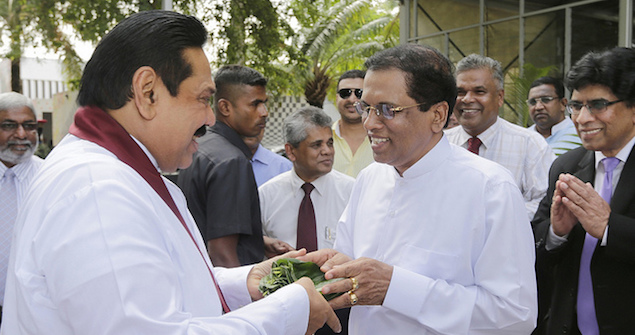The Sri Lankan parliament, on Wednesday, November 14, voted out controversially appointed prime minister Mahinda Rajapaksa. The vote came a day after the country’s supreme court stayed president Maithripala Sirisena’s decision to dissolve the parliament and call for flash polls in January. The parliament session on Wednesday was marked by high drama as Rajapaksa and some of his supporters walked out, and attempts were made to stall the proceedings. Finally, speaker Karu Jayasuriya called for a voice vote and declared the house to be in support of deposed prime minister Ranil Wickremesinghe. Rajapaksa and his faction have refused to accept the voice vote.
The constitutional crisis
The current constitutional crisis began when president Sirisena dismissed Wickremesinghe and dissolved the cabinet on October 26. This was after the Sirisena-led faction in the divided United People’s Freedom Alliance (UPFA) broke away from the national unity government, formed in alliance with the United National Party (UNP) led by Wickremesinghe in 2015. Immediately, Sirisena swore in former president Mahinda Rajapaksa as the new Prime Minister. Rajapaksa who was the president of Sri Lanka for nearly 10 years, was accused of corruption, authoritarianism and nepotism, as well as cracking down on critics. His tenure was also marked by war crimes against the Sri Lankan Tamil minority during the war against the Liberation Tigers of Tamil Eelam (LTTE). Sirisena was a minister in Rajapaksa’s cabinet before taking him on in the elections of 2015. A few days ago, Rajapaksa left the Sri Lanka Freedom Party to join the Sri Lanka Peoples Party that his supporters had set up last year.
The swearing in was followed by postponement of parliament’s budget session until November 16. Observers speculated that this was an attempt at getting more time for Sirisena and Rajapaksa to prove a majority.
While Rajapaksa and Sirisena formed a new cabinet, parliament speaker Karu Jayasuriya refused to recognize the new government and any actions taken since October 26 as valid, unless verified by a majority in the parliament. Wickremesinghe too refused to recognize the presidential order dismissing him and claimed it was unconstitutional. He cited the 19th amendment to the constitution which restricts the president’s power and prevents him from dismissing the prime minister unless under very specific circumstances. Wickremesinghe also continued to occupy the prime minister’s residence, Temple Trees, along with his supporters, in protest. This effectively put Sri Lanka in a very peculiar position of having two competing claimants for the prime minister’s post.
Meanwhile, pressure mounted on the president to convene parliament earlier. A petition to this effect was submitted by nearly 119 of the 225 MPs on November 2. After nationwide protests and pressure from various international actors, president Sirisena declared on November 4 that parliament would meet on November 14.
Meanwhile, it was increasingly clear that Rajapaksa would not be able to prove his majority. There were allegations that his faction was attempting to bribe UNP MPs. Rajapaksa also tried to win over smaller but significant forces such as the Tamil National Alliance (TNA) but to no avail. Sirisena’s role also was heavily criticised. On November 9, he transferred the department of government printing, and the police, which were earlier under the ministry of law and order, to the ministry of defence, which is directly under the control of the President. This effectively brought the police, the military and the gazette under him.
Parliament reconvened
Later on November 9, Sirisena yet again stunned the country by dissolving parliament and calling for fresh elections on January 5, 2019. Sirisena’s decisions caused the country to erupt in protests yet again. On November 12, Wickremesinghe and his supporters challenged the president’s decision in the supreme court. The next day, a three-judge bench stayed the presidential order until December 7. Meanwhile, the speaker called for parliament to convene on November 14, as was earlier scheduled.
It was in this context that the parliament session began on Wednesday amid much chaos. Rajapaksa and his son Namal, who is also an MP, left the house before the vote took place. The MPs of his faction desperately tried to stall the proceedings and the vote. However, the speaker managed to call for a voice vote and declared that the house supported Wickremesinghe as the prime minister. However, the Rajapaksa faction has refused to relinquish its control of the government.
What next for Sri Lanka?
Incidentally, Sirisena’s actions would be have been perfectly legal were it not for the 19th amendment, which he helped co-author and pass in Parliament, along with Ranil Wickremesinghe. The 19th amendment, which reduced the powers of the presidency, was among the key commitments the Sirisena-Wickremesinghe alliance made, while promising a change from a decade of Rajapaksa’s rule. They had also promised more devolution of powers to the provinces, investigation into war crimes during the Sri Lankan civil war and ensuring basic rights for the minorities in a country when Rajapaksa had stoked the flames of Sinhala and Buddhist chauvinism. The break-down of this alliance has been seen a huge blow to the possibilities of a more socially inclusive country. The Sirisena-Wickremesinghe alliance, at the same time, did not plan or effect any major change of policy as far as neoliberal reforms were concerned.
In less than a month, the supreme court is likely to hear petitions against the president’s actions. Many observers have commented that the dismissal of Wickremesinghe will not stand the test of the law. If the court delivers an adverse verdict, it would be yet another huge blow to Sirisena’s credibility. Meanwhile, in the near future, Rajapaksa’s refusal to recognize the vote in parliament can mean a long crisis ahead. Meanwhile, Ranil Wickremesinghe and his faction would definitely be emboldened by the recent developments as they add further legitimacy to his claim to continue as the Prime Minister.





